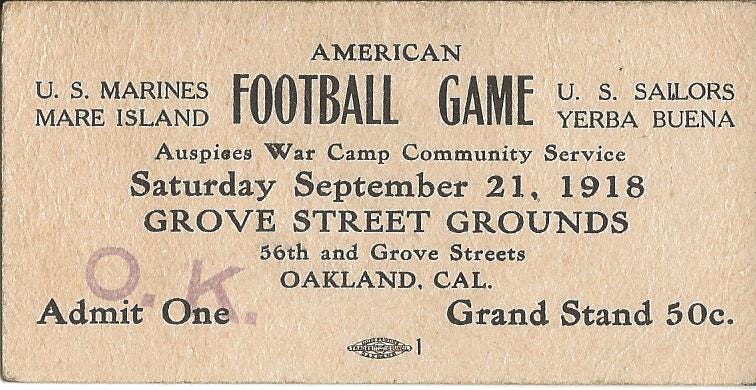The Mare Island Marines Return to Action
After winning the 1918 Rose Bowl on New Year's Day, every player on the Mare Island Marines football team went overseas or transferred for further training, so the 1918 team had a new cast of characters. They opened their season on September 21, with a game against the sailors stationed at Goat Island, also known as Yerba Buena Island, in San Francisco Bay. As the opening football game of the 1918 season in the Bay Area, the game was heavily promoted by the local press with the money raised from the game donated to the two bases and a local provider of services to military personnel.
Oakland was in a festive mood that Saturday morning when the teams met at city hall to hear a greeting from Oakland’s mayor, followed by a parade of bands and thousands of supporters to the Grove Street Grounds, a minor-league baseball park expected to fill to its capacity of 8,000.
Mare Island brought thirty-two players to the game, perhaps anticipating the opportunity to play a few subs that afternoon. The game opened with Goat Island kicking off to Mare Island with the coverage stopping Mare Island short of the twenty. On the first play from scrimmage, Mare Island quarterback Dick Hanley gave the ball to his right halfback Fred Glover who took it up the middle for a short gain. The Goat Island team celebrated the stop since it confirmed they could play with the vaunted Mare Island Marines, but they had only taken the bait. As Goat Island’s players puffed their chests, Mare Island quickly lined up. Glover, who had just run the ball from the halfback position, lined up at center, while Jake Risley, the center, aligned at left half. Glover snapped the ball to Hanley and the surprised Sailors watched Hanley scoot around left end for an 80-yard touchdown. Mare Island converted and was up, 7-0. Other than Mare Island gaining field position through Bill Steers’ punting, neither team did much until the last play of the first half when Hanley hit Clarence Zimmerman on a 35-yard touchdown pass as time expired. Dick Hanley missed the conversion, so the Marines held a 13-0 lead at the half.
The second half saw the Marines employ a power running game that led to two rushing touchdowns by Oregon’s Bill Steers and another by Cal’s Jim Blewett for a 31-0 victory.
The first game was followed by a 66-0 trouncing of Camp Fremont, located on Stanford's campus, after which the Mare Island team returned home only to find Mare Island placed under a Spanish Flu quarantine. It lasted nearly six weeks. Other than the civilian workers building and repairing ships, no one entered or left Mare Island during that time, including the football team.
Outside the base, the Oakland and San Francisco newspapers reported on the influenza deaths across the country, showing figures we now know were undercounted. After health authorities in San Francisco and Oakland were slow to order substantive measures to curtail the epidemic, eighty to ninety people died per day of influenza-related symptoms in the city.
With the cancellation of Mare Island’s October schedule, Capt. Lynn Coovert, Mare Island’s Athletic Director, scrambled to arrange future contests. He wanted to schedule and defeat quality opponents while at the same time generating the money needed to pay for Mare Island’s self-funded football operations, but he needed a game and was willing to take on all comers.
In scheduling a November 2 game with Fort Baker, Coovert did not meet either his quality or financial goal. (Fort Baker was a coastal artillery installation that now sits below the northern end of the Golden Gate Bridge and is operated by the National Park Service.)
Arriving at Fort Baker by boat, the Marines kicked off to start the game and the ball rolled over the Fort Baker goal line. Thinking the situation called for a touchback, the Fort Baker players did not touch the ball, letting it sit in the end zone. Mare Island's Lloyd Glover thought otherwise and landed on the ball, scoring the first of his four touchdowns that day. The crowd might have cheered the touchdown, but the game was closed to outside spectators due to the continuing flu epidemic and the Fort Baker soldiers had little reason to cheer. There was little other excitement in the game for the home crowd. The Marines scored three times in both the first and second quarters and twice in each quarter of the second half, winning 67-0. Fort Baker failed to earn a first down the entire game.
In the end, Mare Island earned a win against a poor quality opponent and did not earn a nickel to help pay the cost of a long trip north that began in ten days.
Click here for options on how to support this site beyond a free subscription.



